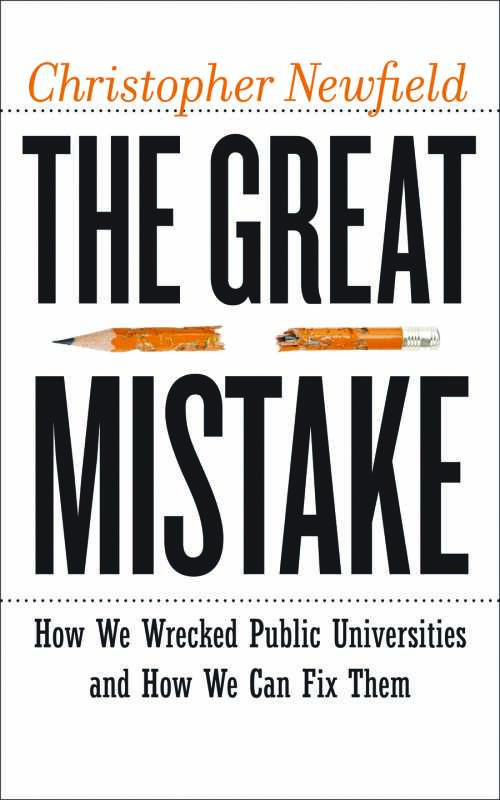Author Says 'The Great Mistake' Was Running Universities Like Businesses
Welcome to college, Class of 2020! If you’ll kindly empty your wallets—and your parents’ wallets—into the bin on the right, then sign here to remain in debt for the next twenty-one years, we can get started giving you a cut-rate education with high administrative costs and low standards. Then, please be kind enough to enter the bloodmobile, and give until it hurts, to purchase your textbooks.
Well, this is only a slight exaggeration. In The Great Mistake: How We Wrecked Public Universities and How We Can Fix Them (Johns Hopkins University Press), Christopher Newfield lays the blame on running universities as if they were businesses. In our interview below, Newfield has a few ideas on how we can fix the education mess.
We’ve seen the private-sector model being used in local schools and in local governments, with very controversial results (Flint, Michigan). What is wrong with running universities “like a business”?

Christopher Newfield: 'They treat higher education as a commodity product---the diploma---rather than as a learning process.'

Although Flint is an extreme example, businesses generally make human services worse, not better! Businesses logically focus on cutting costs and charging the most they can for the lowest quality competitive product. You don’t offer any extra value for the customer’s money that you don’t have to. If you do, your costs go up, your competitors can offer a lower price, and you lose business.
This isn’t just theory. We have a whole for-profit university sector to prove the point. They treat higher education as a commodity product—the diploma—rather than as a learning process, so students don’t know what they should be paying for. They get up to 90 percent of their revenues via government student loans, charge a price set by premium private universities, pay millions of dollars in salary to their executives, blow a quarter of their revenues on marketing, and spend very little money on actual education. All this produces the worst outcomes at the highest cost in the world.
One thing that led me to write this book is my earlier research showing that universities have always been run like businesses—small businesses—particularly since the late nineteenth century. So how could being “more like a business” transform universities now? A good example of traditional university business is the prevalence of the large lecture course that everyone now complains about: it offered good-enough learning at a much lower cost than a seminar. That allowed universities to use the profits from these financially efficient courses to subsidize other things, like seminars, research laboratories, and administration. But we now see clearly that lecture courses are financially efficient yet educationally inefficient.
Of course business is full of wonderful smart people who have advanced skills that universities need to hire. But we have come to think that every activity is a business, and that is both wrong and destructive. In human services, business makes you constantly squeeze and downgrade things that need to be good or great. Of course it’s not cost-efficient to spend money on your kid’s math camp, sports program, or music lessons. Your kid doesn’t need those lessons. But she should have them. They have personal nonmarket benefits, and benefits to the wider society.
Do you think every American should have the “right” to higher education, tuition-free, provided by the government?
I think more in ethical, educational, and practical terms. Given today’s economy and society, every American should have the same right to a bachelor’s degree that they now have to a high school diploma. My personal priorities are racial equality and, at the same time, personal enlightenment in the traditional philosophical and existential senses, for the whole society. Our society and politics will go nowhere as long as race-based hierarchies persist.
Gross disparities in the financing of universities locks hierarchy in place. I do think people have the right to equal access to education, and that means access to roughly equal quality, not some cut-rate version that gets the majority next to nothing in the way of improvement. Higher education needs to be leveled up—increased to a better standard—in the way we’ve tried to do for K-12.
As for college costs, we need to limit total cost of attendance and not just tuition. My estimate in the book is of a ceiling of about $4,000 a year total for everyone who can’t pay out of pocket. Free tuition is a means to that end. And we can afford it.
College students going back to school now can expect to not only go further into debt through college loans, they’ll be shaken down by textbook publishers. Is this situation sustainable?
Yes it’s sustainable if nobody does anything. Politicians are starting to focus on textbook costs, and that’s good. But their solution is often free materials, meaning they expect scientists and scholars to provide research, writing, and editing for free. That “free content” model will make the problem worse.
In reality, publishers are gouging students for textbooks, gouging universities for overpriced journals, gouging granting agencies by forcing them to include funding to pay hundreds or thousands of dollars for article publication, and gouging professors by forcing them to buy back the research the publishers didn’t pay for in the first place.
This is another example of the inefficiency of running knowledge activities like businesses: publishers are intermediaries—trolls, actually—who take a slice of everybody’s action by controlling access to the ferry across the river. People are working on better publishing models now. Students, faculty, and university interests are completely in sync here. We need to pay the costs of production, but not the costs of the publishers’ monopoly profits.
When did the “great mistake” occur and when can we implement a great fix?
The great mistake was for our political system to give up on the democratization of intelligence. By that I mean the idea that, in a democracy, we must see the entire population as potentially intelligent if we educate them fully and fairly. The great mistake is to think we can advance by piling our best resources on a small elite—the 2 percent or so who go to Ivy-League-like private universities and liberal arts colleges. We have been trying this for many decades now—expanding enrollments while keeping everyday quality low. It is failing. I read the other day that political speeches were given at a 12th grade level in 1960, but are being delivered at a middle-school level today.
The fix is already starting. Bernie Sanders got free college on the Hillary Clinton agenda. Her version is inadequate, but her administration will serve as a staging ground for a renaissance of ideas about increasing learning nationwide, improving research funding, and getting price-gouging intermediaries out of education.
You work in academia. When did you realize that something wasn’t quite right with the way universities are run?
I figured this out in my second year as an assistant professor in the early 1990s, when the University of California couldn’t pay for my $750 “merit” raise. That year, I started to study budgets in an unsystematic way. I had good mentors and spent close to ten years on academic senate committees on planning and budget. Budgets tell great stories, which appeals to my literary as well as numerical interests. In any case, my entire career has been shadowed by a false economics in education. It gives me deep sympathy for the millennial generation, who have had the same thing happen to them only worse. The U.S. has survived alright under this permanent austerity, where every 2 percent increase to cover inflation requires endless pleading from university officials. But in other places, particularly in Africa, the kind of “structural adjustment” we’re now seeing in the U.S. has eliminated good public universities in most of that continent’s countries. It’s a human tragedy on a global scale, and a completely unnecessary one.
Universities could be run better than they are. But most of the problems come from too much service to business goals rather than not enough. Once we see the problem clearly, as The Great Mistake helps us do, the solutions will be much easier than they seem right now. And if we can get the benefits of the fix—top quality for all students—it will be an incredible boon to society.

Howard Lovy is executive editor at Foreword Reviews. You can follow him on Twitter @Howard_Lovy
Howard Lovy
